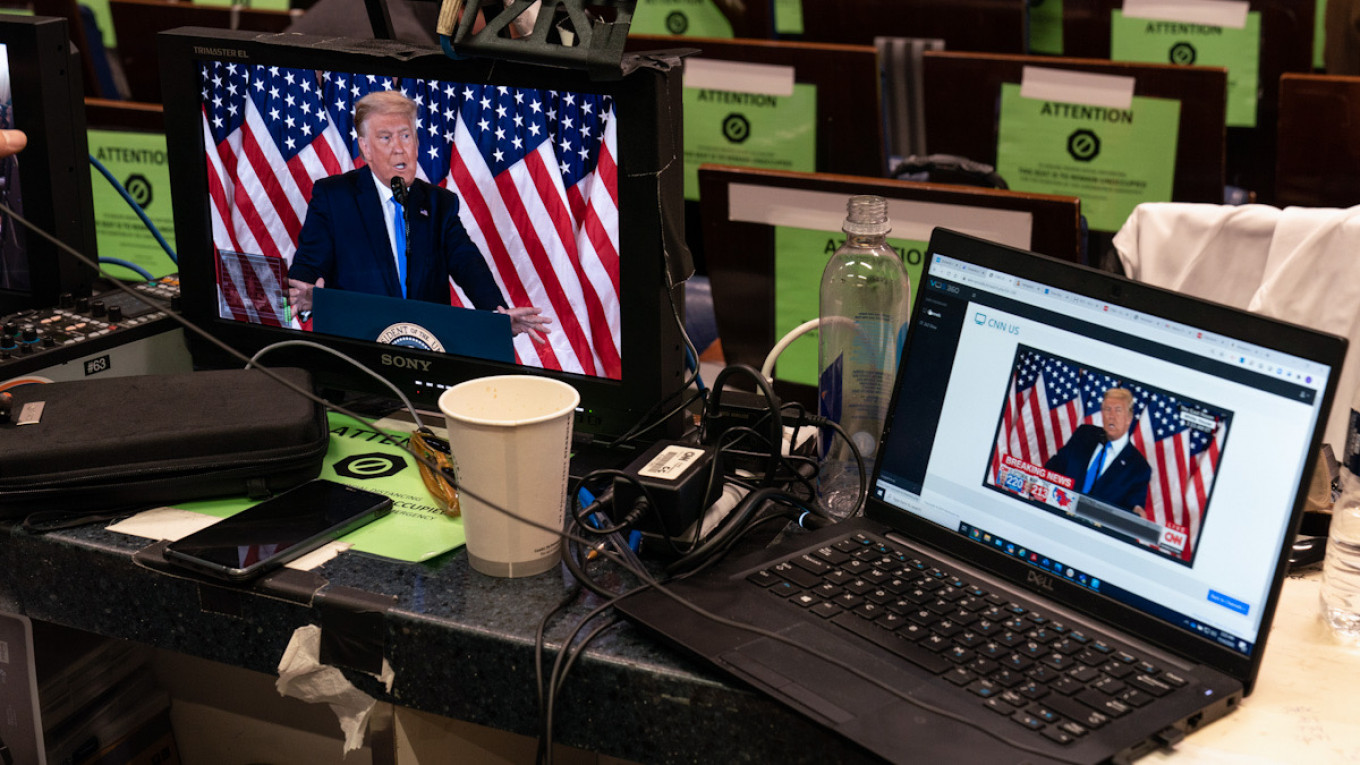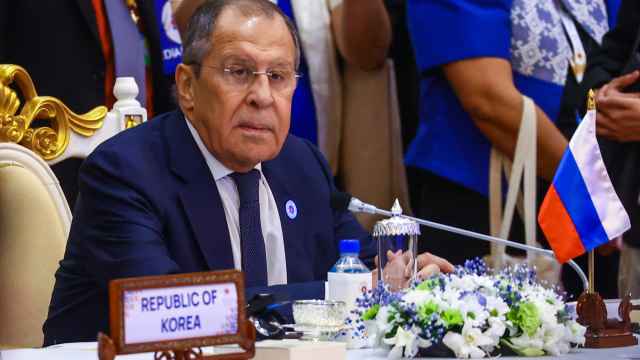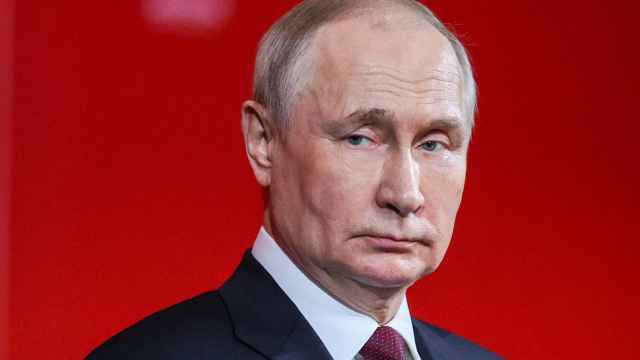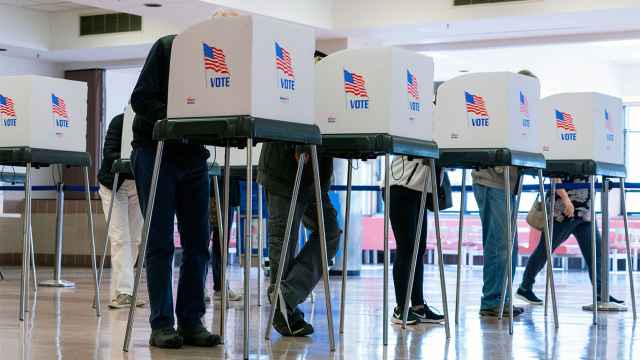Now that the U.S. elections are over, one may hope — a vain hope, perhaps, but a hope nonetheless — that the myth of Donald Trump as a Russian asset propelled into the White House by a cunning Kremlin will finally be put to rest.
It’s not that the Trump campaign didn’t try to collude with the Russians — whether out of incompetence or greed or both — all the evidence suggests he did. And it’s not that Russia didn’t interfere, it certainly tried. It’s just that installing Trump as U.S. president is neither in Moscow’s interests nor within its capabilities, and never has been.
The infamous Steele Dossier has been discredited by Russian journalists, while here in DC it’s becoming clear that, whoever wins once all the votes are counted, America will have to contend with the fact that very nearly half of voters still chose Trump the second time around despite his handling of the coronavirus crisis and without much help from Moscow.
Nevertheless, my social media feed has been buzzing with Russian commentators of the pro-Kremlin variety, either hyping for Trump or calling out the Democratic Party for fraud. The day after the elections, my 13-year-old daughter was arguing with Russians on TikTok that no, actually, there’s no reason to think Joe Biden will start a war with Russia. Vladimir Zhirinovsky — the nationalist MP who notoriously drank champagne when Trump was elected in 2016 — told journalist Marc Bennetts that he wanted to take part in Biden’s funeral. According to one poll by Moskovskie Novosti, over 70% of respondents in Moscow said they favored Trump.
Much like the last time around, it seems an awful lot of Russian commentary on the U.S. election is either favorable to Trump, or, as is the case with some media, tends to amplify election-related unrest.
All this — especially when promoted by Kremlin-controlled English-language media — may well fuel the idea of Trump as Putin’s puppy. But in doing so, this seemingly pro-Trump rhetoric coming out of Russia may also reveal why the Trump-Putin thing, or whatever it is they have going, has been so misunderstood in the United States.
The reality is that this rhetoric in the public sphere is not a reflection of the Kremlin’s strategic intentions and should not be regarded as such.
The Kremlin has no clear investment in Trump, nor in a destabilized United States. Moscow is well aware that in practical terms Trump’s presidency has hit hard at Russia’s strategic interests due to sanctions and plummeting relations overall. President Vladimir Putin admitted as much in a recent interview. He also lavished the Democratic Party with praise for its supposedly “socialist” roots. Most importantly, he downplayed Biden’s hawkish rhetoric toward Russia and spoke instead of “serious” signs that the Kremlin could cooperate with a Biden administration.
Putin may well have simply been diplomatic, but Russian officials and policymakers have also been wary of another Trump presidency. For example, one serious result of the last four years has been, in the words of Russian International Affairs Council (RIAC) president Igor Ivanov, that “Moscow has been consistently pushed out of its traditional weapons markets.” It’s not that Biden would be much better in terms of Russian-U.S. relations, but at least he might bring a certain predictability to the dialogue, one official told me this summer.
Why, then, the seemingly pro-Trump rhetoric in the media? The schadenfreude at election-related unrest?
Simply put, it’s because the Russian media is not a mouthpiece for the Kremlin’s intentions. Even if its messages are deliberately designed, they often differ depending on whether they target domestic or foreign audiences. The pro-Trump rhetoric I am seeing is in Russian, for Russians. That might mean many things, but it doesn’t necessarily reflect what Kremlin strategists are thinking.
Some of it may simply be genuine. After all, Americans aren’t the only people to fall for a demagogue. In a lot of cases, however, commentators seem to be reveling in the political dysfunction coming from a superpower that once lectured Russia on democracy.
But what also emerges is possibly the only real use that Putin ever had for Trump — making Putin look like the adult on the global stage. This is precisely what Russian media at home have been milking for the last four years, and what they are continuing to do. What could be better for domestic propaganda than gawking at the dysfunction of your opponent?
And when Biden calls Trump Putin’s puppy? Putin himself has said comments like these lend Russia “some extraordinary influence and power,” without having to do hardly anything yourself.
If Trump leaves the White House, he may leave as a convenient optical illusion of Russia’s relative influence, but one that has created a lot more problems for Russia in his wake than it has solved.
A Message from The Moscow Times:
Dear readers,
We are facing unprecedented challenges. Russia's Prosecutor General's Office has designated The Moscow Times as an "undesirable" organization, criminalizing our work and putting our staff at risk of prosecution. This follows our earlier unjust labeling as a "foreign agent."
These actions are direct attempts to silence independent journalism in Russia. The authorities claim our work "discredits the decisions of the Russian leadership." We see things differently: we strive to provide accurate, unbiased reporting on Russia.
We, the journalists of The Moscow Times, refuse to be silenced. But to continue our work, we need your help.
Your support, no matter how small, makes a world of difference. If you can, please support us monthly starting from just $2. It's quick to set up, and every contribution makes a significant impact.
By supporting The Moscow Times, you're defending open, independent journalism in the face of repression. Thank you for standing with us.
Remind me later.








